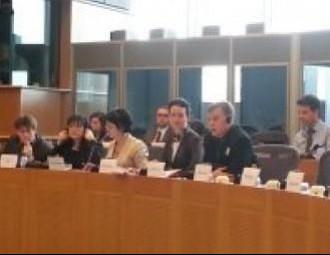Is Europe able to hear Belarus?

The representatives of the Belarusan civil society took part in the hearings on human rights situation in the countries of the Eastern Partnership.
On June 19 the European Parliament hosted a meeting of the Subcommittee on Human Rights to discuss the human rights situation in Belarus, and draft recommendations on the European Union policy in respect of Belarus, based on a report by the MEP Justas Paleckis.
The discussion was attended by Uladzimir Labkovich, member of Viasna’s Board, and Elena Tonkacheva, the head the Legal Transformation Centre. Uladzimir Labkovich stressed a setback in Belarus’s human rights record, focusing on a systemic crisis in the field of human rights.
The meeting addressed the issues of political prisoners, media freedom, independence of the judiciary, opportunities for exercising civil and political rights, as well as death sentences.
Uladzimir Labkovich also emphasized erroneous conclusions made by Justas Paleckis in his draft report alleging certain improvement in the human rights situation, as well as the importance of mentioning requirements on the systemic changes in the field of human rights on the agenda of relations with Belarus.
Elena Tonkacheva, director of the Center for Legal Transformation, highlighted the importance of the EU’s cooperation with the UN international institutions, especially with the Special Rapporteur on Belarus, Miklos Haraszti, as well as other UN thematic Rapporteurs.
Elena Tonkacheva spoke in favour of taking into account the report of the Special Rapporteur and the resolutions of the UN Human Rights Council in assessing the human rights situation in Belarus.
In a comment, a representative of the EU External Action Service, Mr. Reinhold Brender, said that he hoped that any positive developments in relations between the EU and Belarus could be possible in the case of not only the release of political prisoners, but also systemic changes in the field of human rights.
According to spring96.org
-
03.01
-
07.10
-
22.09
-
17.08
-
12.08
-
30.09








































